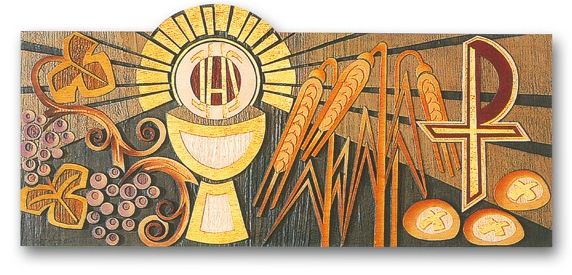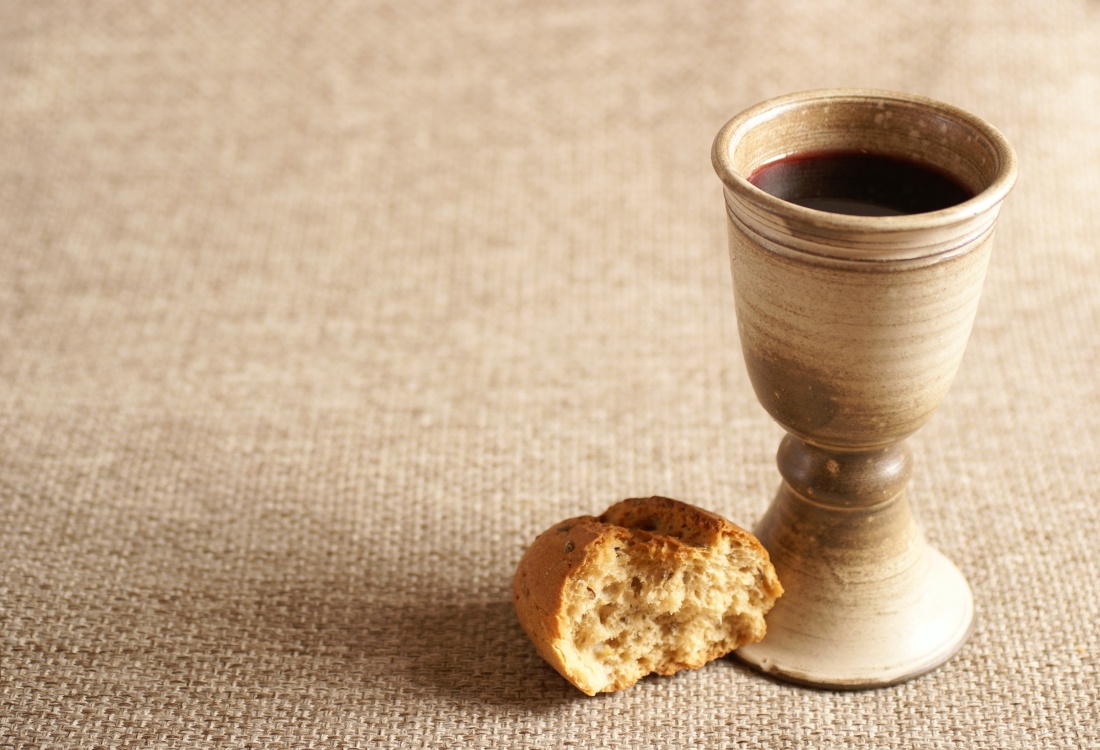a sermon for the thirteenth Sunday after Pentecost [Proper 15B/Lectionary 20B]
John 6:51-58 and Ephesians 5:15-20

The congregation I served back in Pittsburgh had a Wednesday evening Holy Communion service that had been started by the pastor just prior to me. It was an abbreviated worship service, designed only to last about 30 minutes or so. We often only read one Scripture lesson. It was also a spoken liturgy, meaning we typically didn’t have any music with it. It wasn’t a fancy worship service, by any means, but it was very intimate, kind of like the Sunday evening services we held here last year. When it came time to share the bread and the wine, there were typically so few of us that we could all gather shoulder to shoulder right in front of the altar. In fact, by the time I arrived our average attendance was around eight and it rarely climbed higher than that.
A more experienced and courageous pastor might have cancelled it right off the bat, but I was determined to give it a go and see if we could grow it. We tried adding music here and there. We tried worshiping outside in warmer months. We tried all sorts of various little alterations and innovations in order to appeal to more people but nothing seemed to work.
It happened that one Wednesday evening our women’s retreat committee was having a meeting at the same time as that Holy Communion service in another room elsewhere in the building. They had made it a dinner meeting and had ordered pizza to be delivered, but they mentioned to me right before worship that the delivery man might not know which door to come to. I told them not to worry—I would point him in the right direction if I saw him. We went forward with worship and they went forward with their meeting.
Then, right as I was standing in front of the altar about to bless the bread and the wine for Holy Communion, the large, heavy, red front doors of the church cracked open and the evening sunlight streamed through. My arms were spread open in prayer, but all of the worshippers were turning their heads, focusing on the person who propped open the door with his foot and started down the aisle straight for me with a stack of steaming hot pepperoni pizza. The timing could not have been better…or worse? Since there was no one else to receive him, he walked all the way down the aisle with those pizzas and met me at the altar. I eventually paused the service so I could show him out the side door, But for a minute or two there that guy probably thought this pastor will try anything to boost the worship attendance! Pizza for Holy Communion! Let’s party, everybody!

Jesus says, “I am the living bread that came down from heaven, and whoever eats of this bread will live forever.” He means to tell us that the heavy door of heaven has cracked open and he comes down the aisle to give himself for the life of the world.
It’s so easy sometimes to miss this fundamental aspect of Christian faith among the rest of this conversation about bread and wine. The God to whom we pray, the God we worship, the God we call to for life and salvation is a God who comes down to us from heaven. The God who sends Jesus is not a God who asks us to be a certain way or do certain things in order to reach him, as if our task is to climb to his holiness. The living bread comes down from heaven to give life for the world. Let’s party, everybody!
Although those of us in the sanctuary that night didn’t get to eat it, the pizza made us think again how the whole story of Jesus is one about delivery. It’s not take-out. It’s not pick-up. It’s God delivering all of God’s fragile but might self into our midst, repeatedly—delivered into the manger, into the humble fishing life Galilee, into the suffering of ordinary human beings, delivered into our very hands to die on the cross. As the late, great Aretha Franklin once sang in one of her earliest gospel songs:
“Yes, I hear a voice pleading with me,
Quietly, quietly commune with me.
Just steal away in secret and pray
Quietly, quietly, come break bread with me.”[1]
In all honesty, sometimes we might wish Jesus had just thrown something like a pizza party with his disciples. It might make our faith a little more accessible to seekers and newcomers and get us out of this awkward situation where we eat a bit of bread and drink a sip of wine each week. Plus, given the way Jesus himself talks about that meal, it’s easy to see why early Christians were accused of being cannibals. As they wait for his return, as God’s Holy Spirit ignites faith in more and more people, his followers are not just going to gather to remember Jesus and his teachings, they’re not just going to “to sing hymns and psalms and make melody to the Lord in their hearts,” as the writer to the Ephesians says, but to eat of his flesh and drink of his blood.

In fact, if that’s not graphic enough, the word for “eat” that Jesus uses is the English word “gnaw,” which indicates he is not speaking metaphorically here. He is not saying we just consume him and his words with our brain. He is talking about teeth and jaws. He intends for people to eat when they meet for worship. Holy Communion is Jesus’ way to prevent his followers from turning their faith into a head-trip, from making church into some form of a TED Talk or self-help seminar. It’s like God says, “Here. Here’s bread and here’s wine. Can’t avoid it. Real things. God loves created matter. And you are created matter, not just ideas. And you are sent to take care of created things.”
Jesus says these things right after he has multiplied the loaves and fishes and has gotten into an argument with the Jewish leaders about what is the living bread from heaven. They have already failed to grasp how Jesus will be the living bread from heaven, how his life will be even better than the manna that sustained their ancestors in the wilderness as it dropped each night from the sky. Now he takes it another step further by saying that his body will be that bread and that by eating it they will gain eternal life. The living Father delivered him to them, and so now they can take him and eat him and have the same life as the Father.
We think of bread nowadays as somewhat of an optional food, as something that can make some people ill, but in Jesus’ day, and still in many parts of the world, it is the main food. I remember growing up and going to Sunday dinner after church at my grandmother’s house out in the country. They always had fresh rolls on the table. I got the impression that you couldn’t really eat a full meal unless there was bread involved. Fried chicken or barbecue or short ribs might be the main course, but bread is what enabled you to eat it all because, you see, they taught me you eat everything by holding the roll in your left hand so you can sop up everything on your plate and leave it clean.

When we eat of Jesus, we get everything God offers. We realize it sounds strange, and maybe even a little off-putting, but Jesus wants us to know that he comes to deliver God’s life all the way inside of us. When we partake of Jesus, it’s like we’ve got that roll in our left hand: we can sop up everything God offers. This meal embodies the self-giving and self-sacrifice that Jesus is sent to deliver. All of God’s forgiveness and mercy, all of God’s love and compassion, all of God’s justice and concern for those who don’t have enough, all of God’s grace is given to us in this meal. It is a visible, tangible reminder of what Jesus comes to do: give himself. Eating is necessary for life, and so if we’ve got a new life in Christ, it will require food.
Furthermore, if you think about it, and every act of eating anywhere involves a sacrifice somewhere, whether it’s the chicken that was slaughtered at the Tyson plant up off Staples Mill Road or the wheat that was cut out in Nebraska, or the labor of the grandmother that woke up early to get it cooked and arranged just right on the checkered tablecloth. It think most of the time we eat without thinking about that. I know I do. Food implies sacrifice, and this meal that Jesus gathers us around is no different. The fact that Jesus spent his life coming down from heaven to be with you, to feed you, to heal you, to walk with you, is the reason why he gathers you around this table and break bread with you.

A voice is pleading with you, says Aretha. Not just you, of course, but all of us—his body, blessed and broken, shoulder to shoulder we gather, and yes, at a dinner meeting (let’s call this what it is) where we sing psalms and hymns and spiritual songs making melody to the Lord in our hearts, giving thanks to God the Father at all times and for everything in the name of our Lord Jesus Christ.
On that note…I’ve heard many visiting pastors and other visitor friends of mine make comments about how well our congregation sings. I’m so thankful for that. It’s another strange, counter-cultural thing the Spirit has us do. In a day and age when singing is typically something we watch other people do for us (or at us), Christians continue to regularly sing together, make melody—and sometimes even harmony—in our hearts as we make a joyful noise to the Lord.
Let’s be real: we don’t need pizza.
Thanks be to God!

The Reverend Phillip W. Martin, Jr.
[1] “You Grow Closer” Songs of Faith – the Gospel of Aretha Franklin